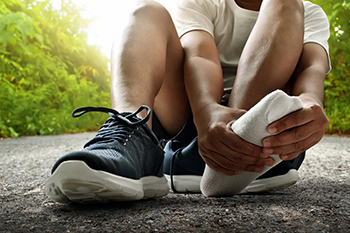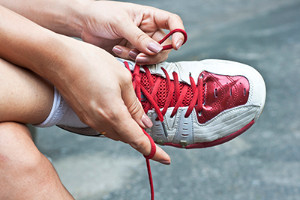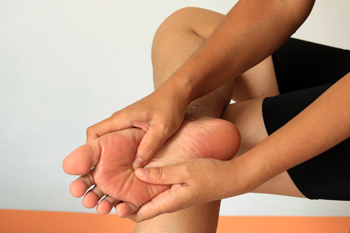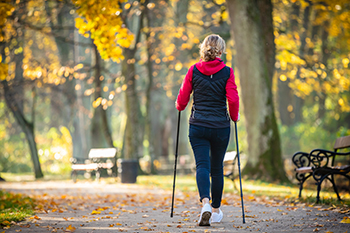NJ (908) 688-5577
NY (212) 737-2528

Running has become a popular method of keeping physically fit, but it can also come at a price. Besides having a certain level of fatigue, running can also cause painful injuries to the feet. Several factors can contribute to foot pain after running, but experts believe that ignoring the pain can often make matters worse. The top three causes of most foot pain are being overweight, overtraining, and wearing improper or ill-fitting shoes. Wearing shoes that do not fit well or are the wrong type of shoe for the terrain on which running takes place can increase the chances of injury, aches, and sore feet. In addition, poor quality outsoles that fail to cushion the feet adequately can cause foot problems. Running on uneven terrain or hard surfaces can subject the feet to more pressure and lead to unnatural strides. Overtraining, especially running farther than the body can handle, often results in foot maladies such as plantar fasciitis and stress fractures. Carrying extra weight is particularly harmful to the feet, which absorb several times the body weight with each step. This opens up the runner to injury or, at the very least, foot aches and pains. If you experience foot pain after running, it is suggested that you make an appointment with a podiatrist.
Exercising your feet regularly with the proper foot wear is a great way to prevent injuries. If you have any concerns about your feet, contact Glenn Davison, DPM of Advanced Podiatry. Our doctor will treat your foot and ankle needs.
How to Prevent Running Injuries
Many common running injuries are caused by overuse and overtraining. When the back of the kneecap starts wearing out and starts causing pain in your knee, this is commonly referred to as runner’s knee. Runner’s knee is a decrease in strength in your quadriceps and can occur if you’re not wearing properly fitted or supporting shoes. To prevent runner’s knee, focusing on hip strengthening is a good idea, as well as strengthening your quads to keep the kneecaps aligned.
What Are Some Causes of Running Injuries?
- One cause of a common running injury is called iliotibial band syndrome.
- Plantar fasciitis is also another common injury.
- Stress fractures can occur from overtraining, lack of calcium, or even your running style.
Best Ways to Prevent Running Injuries
- Wear footwear that fits properly and suits your running needs.
- Running shoes are the only protective gear that runners have to safeguard them from injury.
- Make a training schedule. Adding strengthening exercises as well as regular stretching can help keep you strong and limber and can lessen the possibility of injuries.
- Stretching keeps muscles limber; this will help you gain better flexibility.
If you have any questions please feel free to contact our offices located in Union, NJ and New York . We offer the newest diagnostic and treatment technologies for all your foot and ankle needs.

It is crucial to purchase the right type of running shoes for the specific type of running that is desired. This is true of all types of runners, ranging from beginners to people who have run marathons. The most important factor to look for is a shoe that fits the foot perfectly. Each type of running shoe is designed with various features based on the activity level. Running shoes that have added motion control may benefit people who overpronate, which is when the foot rolls inward as it strikes the ground. These types of shoes tend to be stiff and can provide the necessary support as running is practiced. People who enjoy running marathons may benefit from wearing shoes that have extra cushioning, as the heel consistently hits the ground. There are many different types of running shoes, and it is suggested that you confer with a podiatrist who can guide you on the best pair to purchase for your needs.
If you are a runner, wearing the right running shoe is essential. For more information, contact Glenn Davison, DPM from Advanced Podiatry. Our doctor can provide the care you need to keep you pain-free and on your feet.
Choosing the Right Running Shoe for Your Foot Type
To increase performance and avoid the risk of injury, it is important to choose the right running shoe based on your foot type. The general design of running shoes revolves around pronation, which is how the ankle rolls from outside to inside when the foot strikes the ground.
If you have any questions please feel free to contact our offices located in Union, NJ and New York . We offer the newest diagnostic and treatment technologies for all your foot and ankle needs.

Nearly everyone experiences foot pain at some point in life, and the number of causes is enormous. Foot pain may be caused simply by the way you walk, the way your feet are structured, or the shoes you wear. It can be a result of overuse in a sports-related activity or from landing wrong when you jump. Having either flat feet or high arches are other potential causes of foot pain. Corns on the feet, usually from friction with the inside of the shoes you wear, and calluses that result from other foot problems are common causes. A bone deformity, such as bunions or hammertoes, may affect your gait and cause pain in the joints of the toes and the ball of the foot. Wearing high heels or shoes with a narrow toe box can cause pain in the ball of the foot as a result of a shift in body weight. Overtraining, common among runners, can result in tears in ligaments, especially the plantar fascia on the bottom of the foot. If you are experiencing foot pain and are unsure of the cause, it is suggested that you make an appointment with a podiatrist who can examine your feet, diagnose the cause, and suggest treatment options.
Foot Pain
Foot pain can be extremely painful and debilitating. If you have a foot pain, consult with Glenn Davison, DPM from Advanced Podiatry. Our doctor will assess your condition and provide you with quality foot and ankle treatment.
Causes
Foot pain is a very broad condition that could be caused by one or more ailments. The most common include:
Diagnosis
To figure out the cause of foot pain, podiatrists utilize several different methods. This can range from simple visual inspections and sensation tests to X-rays and MRI scans. Prior medical history, family medical history, and any recent physical traumatic events will all be taken into consideration for a proper diagnosis.
Treatment
Treatment depends upon the cause of the foot pain. Whether it is resting, staying off the foot, or having surgery; podiatrists have a number of treatment options available for foot pain.
If you have any questions, please feel free to contact our offices located in Union, NJ and New York . We offer the newest diagnostic and treatment technologies for all your foot care needs.

Walking is considered to be one of the easiest and most accessible forms of exercise. Lately, a type of exercise called Nordic walking has become more popular, largely because it is easy on the joints and is suitable for all ages and fitness levels. Nordic walking started out as a summer training exercise for cross-country skiers. They use long walking poles to propel them as they walk, similar to how ski poles are used in the snow. These walking poles use the upper body to propel you forward, which relieves pressure on the knees, ankles, and feet. Further, it is believed that Nordic walking can reduce the risk of several serious ailments, including heart disease, diabetes, asthma, and stroke. It also is thought that Nordic walking is no harder on the joints than traditional walking, even for people who are overweight. Besides a good pair of walking shoes, the only equipment needed is a pair of walking poles. After learning the proper technique for using walking poles, you are well on your way. For more information, it is suggested that you contact a podiatrist.
Exercising your feet regularly with the proper foot wear is a great way to prevent injuries and build strength. If you have any concerns about your feet, contact Glenn Davison, DPM from Advanced Podiatry. Our doctor can provide the care you need to keep you pain-free and on your feet.
Exercise for Your Feet
Exercise for your feet can help you gain strength, mobility and flexibility in your feet. They say that strengthening your feet can be just as rewarding as strengthening another part of the body. Your feet are very important, and we often forget about them in our daily tasks. But it is because of our feet that are we able to get going and do what we need to. For those of us fortunate enough to not have any foot problems, it is an important gesture to take care of them to ensure good health in the long run.
Some foot health exercises can include ankle pumps, tip-toeing, toe rises, lifting off the floor doing reps and sets, and flexing the toes. It is best to speak with Our doctor to determine an appropriate regimen for your needs. Everyone’s needs and bodies are different, and the activities required to maintain strength in the feet vary from individual to individual.
Once you get into a routine of doing regular exercise, you may notice a difference in your feet and how strong they may become.
If you have any questions please feel free to contact our offices located in Union, NJ and New York . We offer the newest diagnostic and treatment technologies for all your foot and ankle needs.